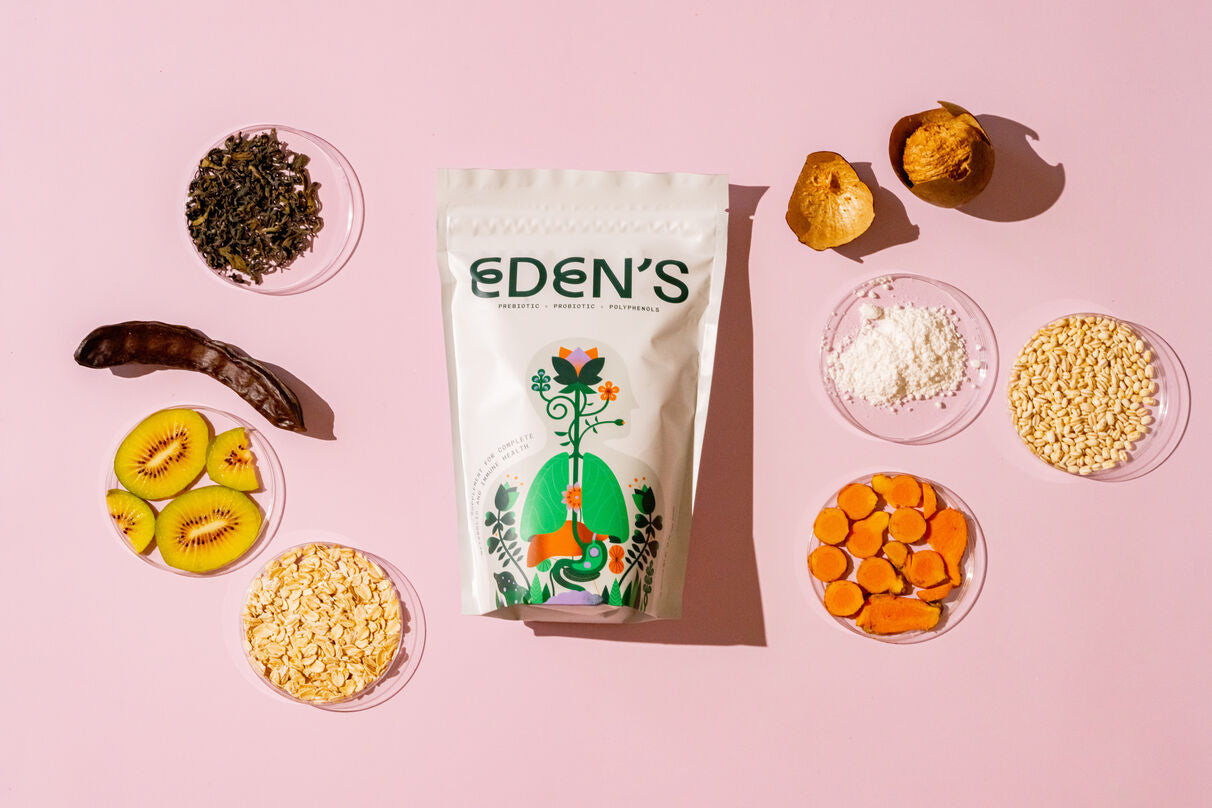Appreciated earliest by Asian cultures not only for their taste, but also for their association with physical and spiritual well-being, green tea and lychee fruit are now enjoyed worldwide, and the perfect pair to highlight in our latest Eden's ingredient spotlight.
On top of their delicious taste, these two food sources provide a wide range of health benefits. Both are rich in polyphenols, compounds with strong antioxidative and anti-inflammatory properties, and scientists are now demonstrating that both have positive health impacts, including reduced risk for cardiovascular disease (CVD), improved glucose response, improved fat metabolism, increased general energy levels and more.
Since extracts of both seem to work even better when consumed together, scientists have formulated them into dietary supplements. Hence our synbiotic supplement here at Eden’s contains one such combined green tea and lychee extract, together with several other polyphenols and a complementary blend of prebiotics and probiotics formulated to support gut health and optimum vitality.
[[product]]
What are green tea and lychee?
Throughout Earth’s history, humans have optimized their health and prolonged their lifespans by cultivating the earth. Asian cultures are particularly well known for their appreciation for and use of our planet’s bounty. East and Southeast Asian inhabitants have cultivated and harvested green tea and lychee fruit for millennia.
These foods not only served as powerful tribute items, but were also well-known for their ability to rejuvenate both body and spirit. Today, both food items are enjoyed the world over and grown in a variety of warm regions, such as South Africa, Brazil, and the Caribbean. Some facts and features of each:
Green tea
- Used as the base for a soothing hot drink
- Derived from the tea plant, Camellia sinensis. (Any kind of tea not produced from this plant is called an herbal tea.)
- Comes in thousands of varieties, depending on how the tea leaves are prepared after harvest. These processing steps impact the tea’s taste and nutritional content.
- The least processed of all teas, because the leaves are immediately dried without a withering and bruising process.
Lychee
- A sweet-tasting fruit used in many drinks and desserts
- Comes from lychee trees, native to countries across Asia as far west as India and as far east as Papua New Guinea and China
- Flesh of this fruit is very sweet and safe to eat, but the skin is inedible and lychee seeds are poisonous
[[mailing_list]]
Health benefits of green tea and lychee
The varying tastes of green tea and lychee make it hard to believe that they can also be healthy. Yet the Asian ancestors were on to something, as research has demonstrated the following health benefits of these two food sources, leading us to use them as part of our Eden's synbiotic.
-
Potent antioxidant properties: Both foods contain polyphenol substances that cancel out the production of reactive oxygen species (ROS) by your cells. ROS are produced as your cells grow and divide, but they can damage the chemical backbones of your cells — including DNA, proteins, and fats. ROS overproduction is also a driver of inflammation and is associated with cancer onset.
-
Green tea contains catechins, polyphenols that neutralize ROSs.
-
Lychee contains three distinct molecules classified as flavonoids, another class of polyphenols: proanthocyanidin B4, proanthocyanidin B2, and epicatechin. Each of these flavonoids is also a strong antioxidant.
-
Association with cancer risk reduction: Multiple epidemiological studies have shown that green tea reduces the risk of cancer. Most of these anti-cancer effects are derived from catechins. For instance, lab research on mouse breast cancer tumors showed reduced growth upon exposure to green tea catechins. Similar results have been observed for lychee extracts in breast cancer cell lines, but more clinical research needs to be done to confirm these findings.
- Contribution to better cardiovascular health: According to some research, consuming green tea reduces the risk of cardiovascular disease (CVD).
- Improved glucose control: While researchers have yet to determine the effects of lychee fruit on glucose levels, a body of research does show that green tea consumption is beneficial for controlling blood glucose levels. In one study, consuming green tea reduced fasting glucose levels, as well as hemoglobin A1c, a marker of type 2 diabetes (T2D). Subsequently, another study confirmed the reduction of fasting glucose levels, but not for the hemoglobin A1c marker.
-
Improved fat metabolism: Consumption of green tea also speeds up fat breakdown, both at rest and during exercise. Similar benefits have also been observed in rats, with obesity and/or non-alcoholic fatty liver disease (NAFLD), who ate lychee.
- Possible reduced risk of neurodevelopmental disorders: The polyphenols present in green tea may also reduce cognitive defects associated with Parkinson’s and Alzheimer’s disease. The flavonoids found in lychee may also help protect against Parkinson’s disease by reducing the effects of ROS on nerves.
Green tea has gained widespread popularity for its numerous health benefits. Studies have explored the effect of green tea consumption on various aspects of health, highlighting its potential beneficial effects. Green tea contains caffeine, albeit in lower amounts compared to black tea, which contributes to its stimulating properties. Regular intake of green tea may positively impact cardiovascular health, with research suggesting an association between green tea consumption and reduced risk of cardiovascular disease.
Additionally, green tea polyphenols, such as tea catechins, are believed to exert protective effects against certain types of cancer. The beneficial effect of green tea extends to weight management, with evidence indicating its role in supporting weight loss efforts. Moreover, the antioxidant properties of green tea polyphenols may contribute to overall well-being by combating oxidative stress and inflammation in the body. As ongoing research continues to unveil the potential health benefits of green tea, incorporating this refreshing beverage into one's daily routine may offer a simple yet effective way to promote health and vitality.
The relationship between tea consumption and various health outcomes has been a subject of interest in scientific research. Studies have delved into the effect of caffeine found in green tea and its impact on human health.
Researchers have found that green tea, particularly when consumed daily, may offer a protective effect against certain health conditions. Evidence suggests that regular intake of green tea can help in weight management, with some studies indicating potential benefits of green tea extract supplementation. The association between green tea consumption and cardiovascular health has also been investigated, with findings suggesting a potential positive correlation.
Both black and green tea, common varieties in many cultures, have been studied for their potential health benefits. Whether green tea or black tea offers superior health effects is a topic of ongoing research. The catechins found in green tea are believed to play a role in its health-promoting properties, including potential protection against cancer.
However, it's essential to note that large amounts of green tea consumption may have adverse effects, particularly due to its caffeine content. Studies have also explored the effects of green tea on blood pressure, with some suggesting a potential lowering effect. While research continues to uncover the various health effects of green tea, it's evident that moderate consumption, such as one cup per day, may offer benefits without adverse consequences.
Antioxidant-rich foods: Not all are healthy
Antioxidants are important molecules that protect your body from the damage caused by oxidative stress. However, foods rich in antioxidants aren’t necessarily healthy for all of us.
For instance, the caffeine in green tea — which may not represent an adverse health issue for most of us — could exacerbate symptoms of hypersensitivity, insomnia, and a racing heartbeat for individuals prone to such problems. Similarly, people who are pregnant, those who have sleeping problems, and those with IBS flare ups might be advised to limit or avoid caffeine intake.
Another example: red wine. Yes, it contains the polyphenol, resveratrol, an antioxidant associated with lower risk of dying from heart disease, and yet the alcohol component certainly could not be called nutritious. The numerous medical risks highly associated with alcohol consumption — in any quantity, even “moderation” (now defined by some medical organizations as one drink or less per day, man or woman) — far outweigh any minimal benefits from the polyphenol component.
Because antioxidant-rich foods aren’t always as healthy as they’re touted, supplements are worth considering (see our next section) as a way to consume the correct amounts and types of important polyphenols, including those found in green tea and lychee. (However, individuals being treated for cancer should be wary of any supplements containing green tea and lychee extracts, as they may render chemotherapy less effective.)
Enter Oligonol, the polyphenol-packed supplement ingredient
While antioxidant-rich drinks and foods such as green tea and lychee each have their own powerful impacts on human health, combining those two ingredients into a supplemental extract affords unique benefits. Scientists have developed a new polyphenol — “Oligonol” — made by linking together individual polyphenol molecules extracted from powdered tea leaves and lychee fruit. Olignol is essentially 85% lychee and 15% green tea, and it has been clinically proven to have excellent absorption, which may enhance the efficacy of multitudinal health benefits.
Several scientific studies have revealed myriad benefits of Oligonol consumption, including:
On top of these benefits, Oligonol is generally considered safe to consume. Extensive toxicity tests have shown that Oligonol does not cause genetic mutations or any negative impacts to the liver or kidney. Even so, you should talk to your medical provider before adopting any supplementation plan, especially since certain foods and supplements might not be appropriate for everyone to consume, as we detailed in the previous section.
Key takeaways
While individuals with certain pre-existing conditions may need to take care with foods rich in antioxidants, their general safety means that supplementing your diet with polyphenols might just give you the boost you need to live a longer, healthier life. Green tea and lychee, food sources enjoyed the world over, contain potent antioxidant substances that have been correlated with reduced obesity, lower CVD risk, and protection from organ damage arising from oxidative stress, a comorbidity of diseases such as diabetes and NAFLD. Now, with Eden’s, you can reap the benefits of green tea and lychee in a supplement formulation that also includes beneficial probiotics and prebiotics, as well as several additional polyphenols.

